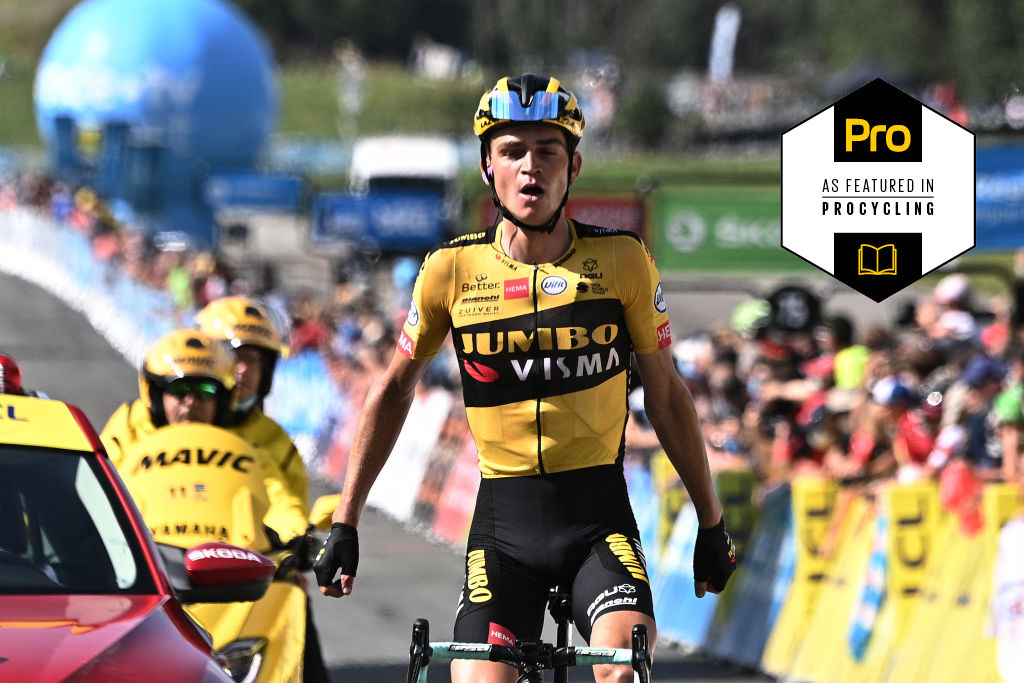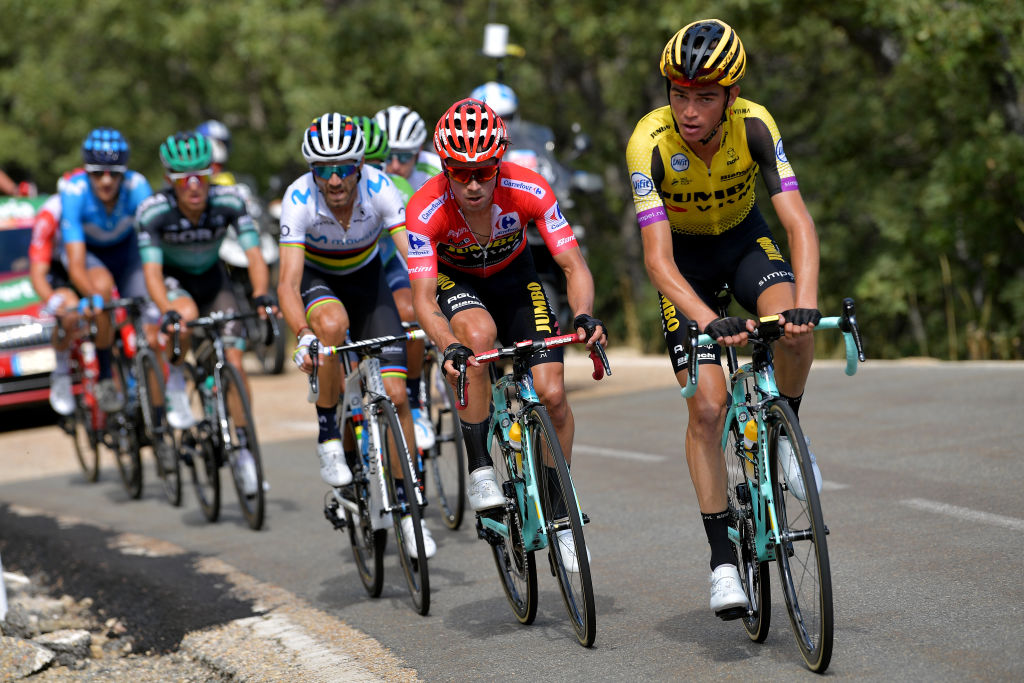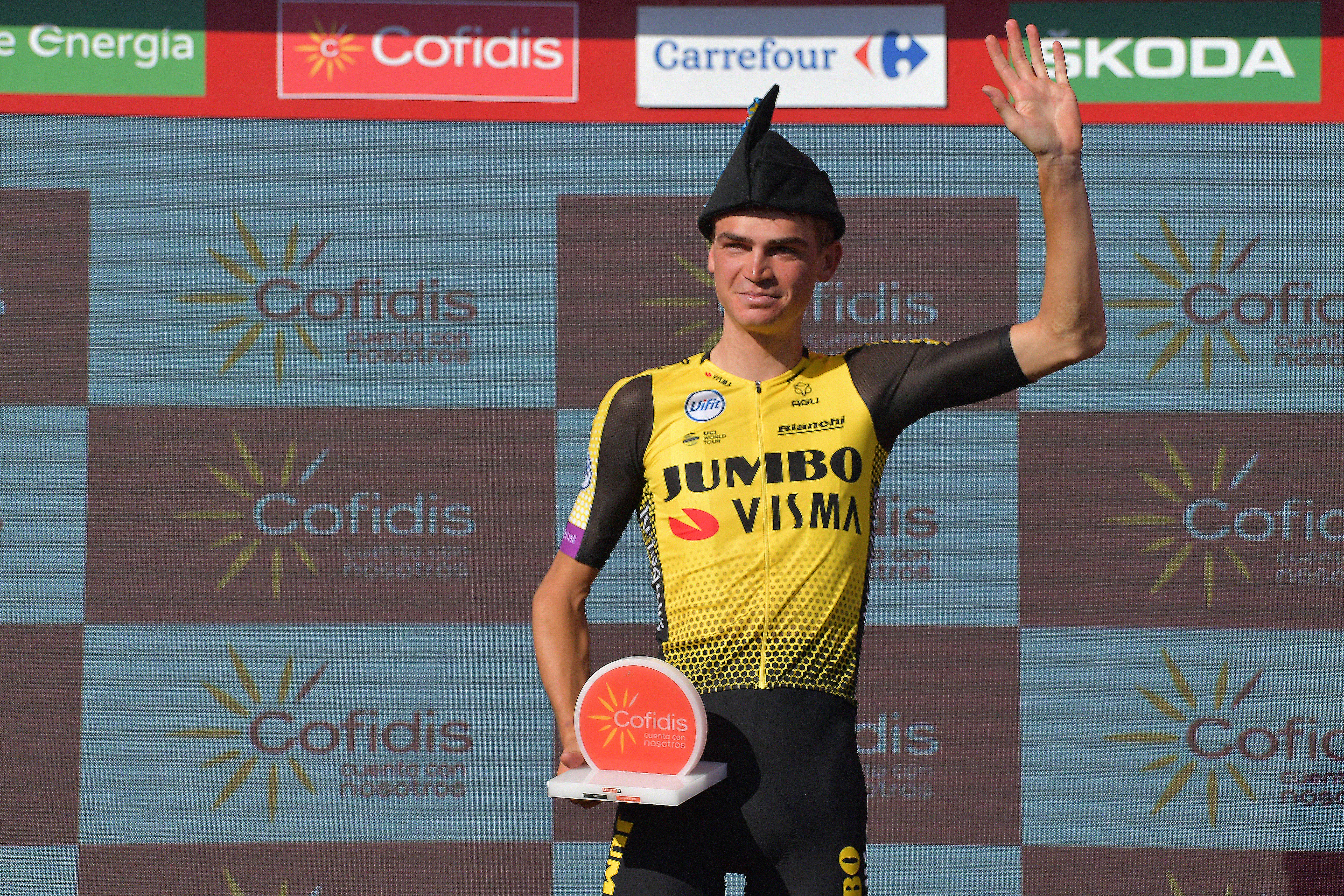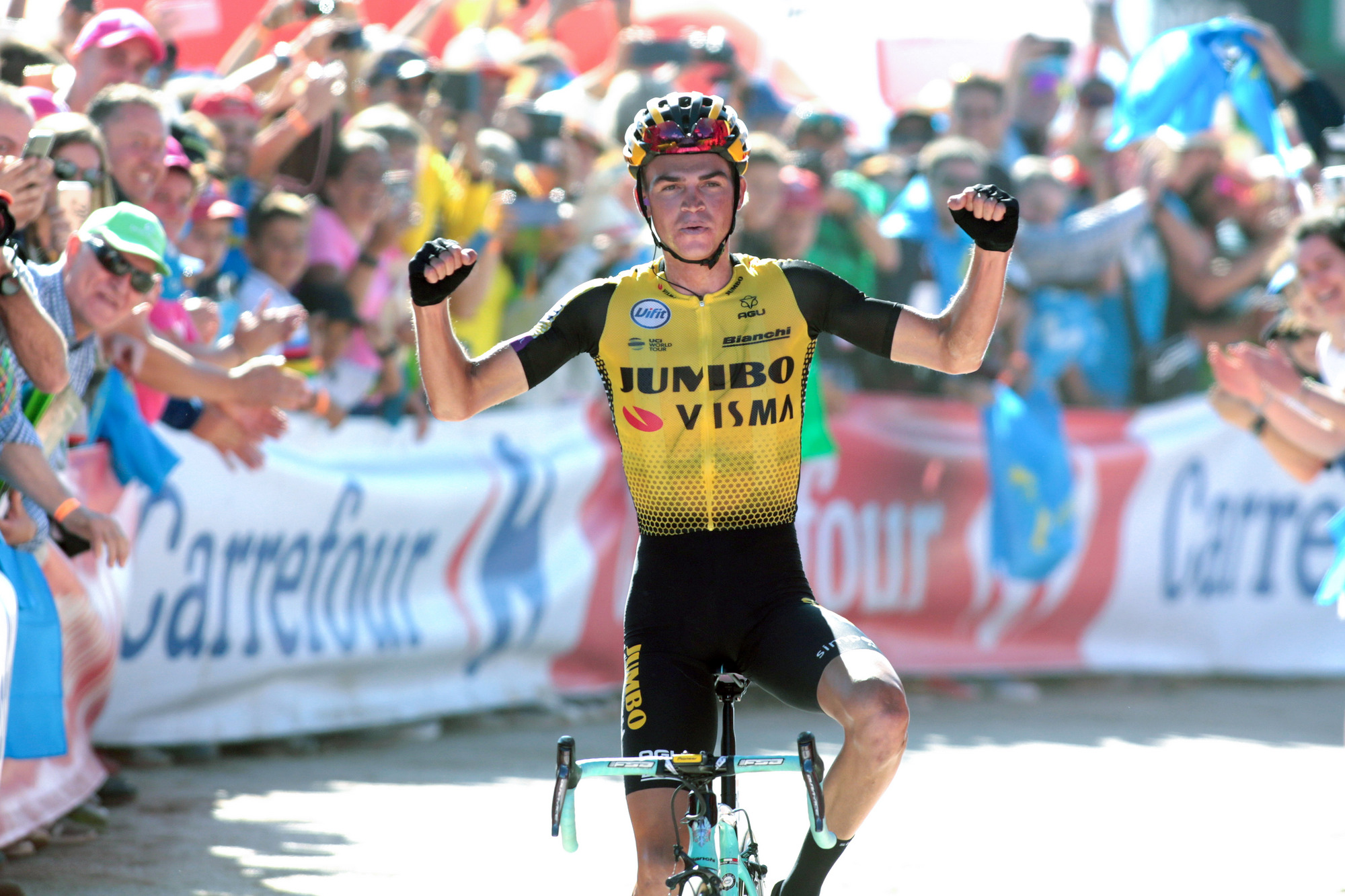Sepp Kuss: I'm always going to be a work in progress
American climber tells Procycling magazine why he can't imagine himself as a Grand Tour contender

This article featured in Procycling magazine issue 268, May 2020
Grounded is an odd word to use to describe one of the best young climbers in the professional peloton, but it’s the word that springs to mind when you first meet Sepp Kuss, the Coloradan climber who has flown high in the mountains over the past couple of seasons.
Back in February, before the global health crisis stopped the 2020 season in its tracks, Nairo Quintana was the man to watch. Kuss went toe to toe with the Colombian on Mont Ventoux in the key stage of the Tour de la Provence.
For a moment it looked as if one of the Ventoux’s epic climbing duels might take shape, but Kuss quickly - and wisely - recognised his limits.
"I felt good," he told Procycling as he soft pedalled his way through the crowds to his team bus. "But not good enough to go with Quintana."
As the Colombian climbed clear, Kuss was forced to back off, but the higher he climbed, he said, the better he felt, so he gave chase. "It was more like at home, in the high altitude I’m used to. And I’d prefer to go down fighting and not just follow."
There are some behind the wheels of WorldTour team cars who think Kuss isn’t cut out for leadership duties, citing most often his limited time trialling ability. But you could say much the same of his Colombian rival on Ventoux, and with time trials increasingly tokenistic in Grand Tours, it hasn’t exactly stunted Quintana’s career, especially in 2020.
The latest race content, interviews, features, reviews and expert buying guides, direct to your inbox!
Kuss, now 25, is a resident of Andorra but, as he notes, "like many other American cyclists", spends a lot of time in Girona. He has a winning smile and the fresh-faced, tousle-haired look of a snowboarder huddling over a cold one after a long afternoon on the slopes.
He has also always been at home at altitude. Kuss’s Dad, Dolph, was a well-known US national ski coach and that ensured that his son grew up outdoors, in the mountains, racing in Nordic skiing, a pursuit that led pretty organically to a teenage love of mountain biking, then road racing.

The climbs and trails of Durango and Boulder, already lent a mythology by the achievements of past Coloradans, proved the backdrop to his rise through the ranks, from the Gateway Harley Davidson-Trek team, through Rally and on, across the Atlantic, to where he is now, with Jumbo-Visma’s all-stars.
Kuss didn’t really need cycling. He is a bright kid, thoughtful and well-read, who studied English Literature at the University of Colorado and majored in advertising. He made his debut in the Worlds in Lillehammer, Norway in 2014 as a mountain biker, well before road racing claimed him.
But his results on the road, primarily with the prodigious Rally Cycling team, soon caught the eye. Stage wins in the Redlands Classic and the Tour de Beauce paved the way for a 10th place on Mount Baldy in the 2017 Tour of California and then an exuberant overall victory in the following year’s Tour of Utah.
Then came last year’s memorable summit finish stage win in the Vuelta a España and his key support role in Primož Roglič’s overall success. Suddenly he was one of the hottest young talents in the sport.
'I'll always be learning'
It’s a five-hour drive from Andorra to Aix-en-Provence, where the four-day Tour de la Provence was based. Backstage at the pre-race team presentation, as he and his Jumbo-Visma teammates wait to take to the stage, Kuss is happy to hang out and shoot the breeze.
Kuss seems mature beyond his years, perhaps because his young life has not been without tragedy. His close relative and Blue Angels pilot, Captain Jeff Kuss, was a decorated and renowned aviator in the US Marine Corps, who died during practice runs for an air show in Tennessee.
It’s clear too that he’s adaptable, curious and keen to learn. "When I considered stepping up to the WorldTour there was some interest from American teams, but I knew from other guys and from seeing how the team worked, that Jumbo was a really good team, especially at developing riders," he says, as we wait backstage.
"For me it was never an objective to be on a US team per se. Moving to Europe and everything was already a big change, so I thought, ‘Why not be on a European team too?’ It’s exciting to have aspects of your life that are a bit out of your comfort zone — going to new places, meeting new people, getting new ideas – that’s always fun.
"It’s nice to be with Americans," he explains, "but in bike racing, it’s such a European culture. To learn how to race in Europe, what better than with a Dutch team with lots of experience and knowledge and great riders?"

Is he still learning? "Oh yeah," he says immediately, with a big smile. "I’ll always be learning. I’m still really inexperienced in road racing, in tactics, in understanding the flow of the race, in getting a feel for different races and things like that. Every race I walk away knowing that I’ve made mistakes, but I also walk away having improved in some aspect or in getting advice from teammates and deepening my experience. But yeah, I’m always gonna be a work in progress."
However, that progress accelerated last season when he emerged as one of Roglič’s key climbing lieutenants in his Vuelta victory, and also stole away on the final climb of stage 15 to Santuario del Acebo to claim his breakthrough Grand Tour win in one of the hardest stages of the race.
"It was the biggest highlight of my career, for sure," he says. "I mean, winning a stage in a Grand Tour is a pretty big deal."
What also stood out, apart from the fact that he’d ridden a high quality break right off his wheel, was the joyful way he celebrated, riding over to the crowds by the barriers and high-fiving them as he entered the finishing straight. "If you watch a mountain biking race," he says, "I think most people are doing high fives, so for me it was a normal victory salute, I guess."
Sure, but you wouldn’t see Chris Froome doing that, I point out… You feel that much of a connection with the fans?
"Yeah - I do, especially in the Vuelta because the fans are so animated and they truly love cycling. That day, I remembered all the times I was struggling in races and that people were still cheering me on, even when I was in last place. That’s pretty special to cycling. That doesn’t happen in other sports.
"If you’re losing in other sports, nobody cheers you on. In cycling they cheer you whether you’re winning or losing. A lot of the fans are experienced riders themselves and they know what it is to suffer. I think that’s special."
'I don’t think I have the mindset to be a Grand Tour contender'
Just as this season got going, Kuss’s plans ground to halt. The Volta a Catalunya, his first spring rendezvous, fell by the wayside, as did other mountainous races across Europe such as the Tour of Romandie, the Tour of the Alps and potentially any pre-Tour de France tune-ups, such as the Critérium du Dauphiné.
As we were going to press, the Tour had not officially been cancelled, but Kuss, like everyone else in the peloton, has to reconcile himself to some externally imposed downtime, for an indefinite period. At least he will have time to catch up with family and friends in Colorado.
"When I was young, growing up in Durango, none of my friends rode road - it was almost lame to ride a road bike, like, ‘Why would you ride a road bike when you can go mountain biking and it’s so much more fun and cool?’" he says.
"That was the stigma in Durango I guess, because it’s such a mountain biking town, but as I got older I got more interested in watching road races and I grew to appreciate it a bit more, even though I’d never done any road races myself."
So, what happens when he goes back to Durango now, as a professional road racer?
"Oh, all my mountain bike buddies give me sh*t about that," he smiles. "But not in a bad way. They know that I’m not a changed person, not a traitor! I still ride my mountain bike and drink beers with them. It’s still important to do that."

Yet at the same time, he knows he is forging a stellar reputation in WorldTour racing. The climbing talent he showed in the Vuelta already marks him out as a rider to watch. Does he ever envisage life as a leader?
"It’s something that’s nice to shoot for, but if I look at myself right now, I don’t think I have the mindset to be a Grand Tour contender. I think I have the resilience - I work hard - but there are also so many sacrifices you need to make to be so focused every single day. That takes quite a bit of extra energy that maybe not everybody sees."
However the coronavirus crisis pans out, and however many races are lost this year, he still has time. "Maybe later on, once I’ve become a bit more seasoned it’s possible, but right now, I can’t imagine myself being a Grand Tour contender. It comes with a lot of things outside the race itself, while in the race you have to think about every bit of energy, whether you’re saving it or wasting it. For some guys it comes more naturally, but to me right now, that doesn’t sound too enjoyable."
Instead, Kuss says, he wants to hone his skills in his natural habitat.
"Mountain stages excite me, but it works both ways. If it’s a hard stage, there’s more pressure, like, ‘Okay, I’m a climber, I need to get a result or really be there for the team.’ So, if that’s your terrain you better step up and be able to do it. It’s never easy, because you’re always suffering but it’s also where I’m most at home."
Although he has ridden the Giro and the Vuelta, he admits that his knowledge of Europe’s iconic climbs remains a little sketchy.
"I haven’t ridden the Stelvio. I haven’t ridden a lot in Italy, apart from what I did last year in the Giro. But that’s another thing that drew me to cycling, the history of it, exploring new climbs and learning about them, and all the mountains. And for me to race on an iconic climb like Ventoux, it’s special. It suits me."
'I didn't realise how fickle cycling can be'
But who knows when Sepp Kuss will pin on a number again? Whenever it is, he feels France and Spain offer terrain upon which he can shine.
"While it’s a long way away, everything is leaning towards that. I think the Tour’s shorter mountain stages - the more typical Vuelta-style stage, not like in the Giro with 200km mountain stages - is a bit more in the Vuelta direction. Right now, I think the kind of racing you get in the Vuelta suits me more."
Kuss also believes that Jumbo-Visma’s multiple leader strategy is ideal for the modern Tour. "This year’s route is suited to that with a lot of climbing. It’s less tactical, less of a mountain train-style route, where you say, ‘This is the order to ride in - you’re the third-last guy, you’re the second-last guy, etc.’
"If the climbs are steeper and it’s a short stage, then it’s more dynamic, more a matter of who has the legs," he says. "Then it’s in your favour to have more leaders because you can put one guy up the road, 20 kilometres from the finish, then have another guy attack on the climb or waiting up ahead. Also, the steeper climbs ‘out’ the strongest guys more naturally than a six per cent climb where the teams are pulling."
And if, as may happen, he loses the chance to race in the Tour or has to sit out the rest of 2020 and reboot his career for 2021? "I’m here for the long haul despite the ups and downs," he shrugs. "I definitely realise how fickle cycling can be, even if you have a three-year or five-year contract. In the grand scheme of a working lifespan that’s not that long. I can’t really picture not riding my bike.
"I love to push myself and as long as that’s something I’m really passionate about then the ups and downs are not a problem. I want to stay grounded, have fun, not take things too seriously. Cycling is a hard sport."
If life on the road loses its appeal, he may join the trickle of ex-roadies now converting to Stateside gravel racing, although he sounds a little unconvinced by the ‘groad’ scene.
"Hmmm. Maybe, I dunno," he says coolly. "I’m training on dirt roads so maybe I take it for granted. I mix it up, usually just riding my normal road bike. Sometimes I think that gravel bikes are overrated, a fad. I think it’s here to stay but I wonder if it will keep that culture," he adds just as team DS Jan Boven appears to steer him towards the stage. "If it keeps going in the direction it’s going, is it just going to turn into road racing, in terms of the mentality?
"What would attract me to it would be the scene, being laid-back and nice. But I also wonder, if it keeps growing like it is, if it’s going to keep that. What’s special is that it’s really laid back and down to earth. I just worry that it would lose a lot if it was over-professionalised."
In spite of the doubt over cycling’s immediate future, Sepp Kuss’s medium term will be on the road. When racing starts again, the American will be aiming to pick up exactly where he left off.
Procycling’s Tour de France 2020 review is out to buy now, featuring analysis of all the best bits from the race, plus interviews with the likes of Richie Porte and Marc Hirschi.
Subscribe to Procycling today from just £11.25 per quarter (UK pricing only), while international readers can enjoy 10% off subscription prices by entering the code PRO10 at the checkout.
Procycling magazine: the best writing and photography from inside the world's toughest sport. Pick up your copy now in all good newsagents and supermarkets, or get a Procycling subscription.
Follow @Procycling_magazine